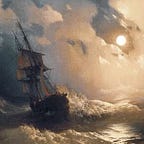An excellent way to check if an old book is worth reading is by seeing if it has ever been banned.
On a cold January morning in 1914, James Joyce published the first part of A Portrait of the Artist as a Young Man. In that very part, on a similarly cold morning just after Christmas Break, Stephen Dedalus stood huddled with other Clongowes students and watched the snow moulding itself around their boots, wondering what made Simon Moonan and Tusker Boyle, in all their ordinariness, kiss in the square.
Napoleon Bonaparte was not born Napoleon Bonaparte. He was born Napoleon Buonaparte. Napoleon Buonaparte was not born in France, but he was born French the way Americans are born British. Of course, they’ve forgotten that by now. They often aren’t allowed to remind themselves, either.
There is very little to say about Fahrenheit 451 that it has not already said about itself. Any review of it is only ever a paraphrasing of some chapter or other, intentionally or otherwise. In the past twenty years, it has been banned at least ten times in the US alone. I imagine censoring a book about censorship gave many people the opportunity to pat themselves on the back. Unfortunately, their intentions, however malevolent, are misplaced. In the book, the people are on the side of banning books. There is no oppression, and no need for revolution. The bars caging a mind are not so easy to topple. The guillotine falls over an empty basket, and symbolism overflows from an empty cup. There is nothing to overthrow when the fault lies with time.
History. What a heavy word.
Christopher Marlow was excommunicated by the Church, and so was one of Shakespeare’s daughters. It is claimed that he based Ophelia off of his wife. I wonder why.
Five years after that day in the square, Stephen Dedalus refused to back down from his claim of Byron’s brilliance. Words like “blasphemous” and “irreligious” pooled around his feet. He cupped his hands in the water and lapped it up. Everything I write now contains some shred of Stephen’s name. I wonder why.
Why is a muse called a muse? To muse is to think, to think deeply. Is a muse’s job to be a conductor of thought? Must all thought be equivalent to love? Why does the word smell like the thickest honey? Why does it sit so heavily on my tongue?
Icarus never meant to fall. If he raced toward the sun, it was only to prove that he could. And he was never on fire. Oh, he burned, alright — the melting wax made sure of it. Did he grasp at the feathers as they came free from the harness? Did he watch them drifting towards the sea? Did he notice anything happening at all? For a moment, a brief, shining moment, the sun was neither hope nor doom, but triumph.
I never could write anything on either the 31st or the 1st. There is something about endings, and something about beginnings. The sun dawned the same on New Year’s Day, but at the stroke of midnight, my phone sang like I lived my whole life before the first light.
Fifteen years after that day in the square, Stephen Dedalus parted with Cranly, unafraid of being alone,
“— and not have any one person who would more than a friend, more even than the noblest and truest friend a man ever had.”
“Of whom are you speaking?” Stephen asked at length.
Cranly did not answer.
They met again, and sixteen years after Oscar’s death, James Joyce retraced his name in “Wilde’s love that dare not speak its name” in a book I have yet to read.
It’s funny how they ban books written centuries ago. Congratulations, John, a pre-industrialization schoolmaster had a wider mind than yours. A clod of dirt shifts as Shakespeare turns in his grave.
History. What a heavy word. I used to think we owed it something.
